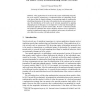Free Online Productivity Tools
i2Speak
i2Symbol
i2OCR
iTex2Img
iWeb2Print
iWeb2Shot
i2Type
iPdf2Split
iPdf2Merge
i2Bopomofo
i2Arabic
i2Style
i2Image
i2PDF
iLatex2Rtf
Sci2ools
PAKDD
2009
ACM
2009
ACM
On Link Privacy in Randomizing Social Networks
Many applications of social networks require relationship anonymity due to the sensitive, stigmatizing, or confidential nature of relationship. Recent work showed that the simple technique of anonymizing graphs by replacing the identifying information of the nodes with random ids does not guarantee privacy since the identification of the nodes can be seriously jeopardized by applying subgraph queries. In this paper, we investigate how well an edge based graph randomization approach can protect sensitive links. We show via theoretical studies and empirical evaluations that various similarity measures can be exploited by attackers to significantly improve their confidence and accuracy of predicted sensitive links between nodes with high similarity values.
Data Mining | Networks Require Relationship | PAKDD 2009 | Sensitive Links | Various Similarity Measures |
| Added | 20 May 2010 |
| Updated | 20 May 2010 |
| Type | Conference |
| Year | 2009 |
| Where | PAKDD |
| Authors | Xiaowei Ying, Xintao Wu |
Comments (0)

